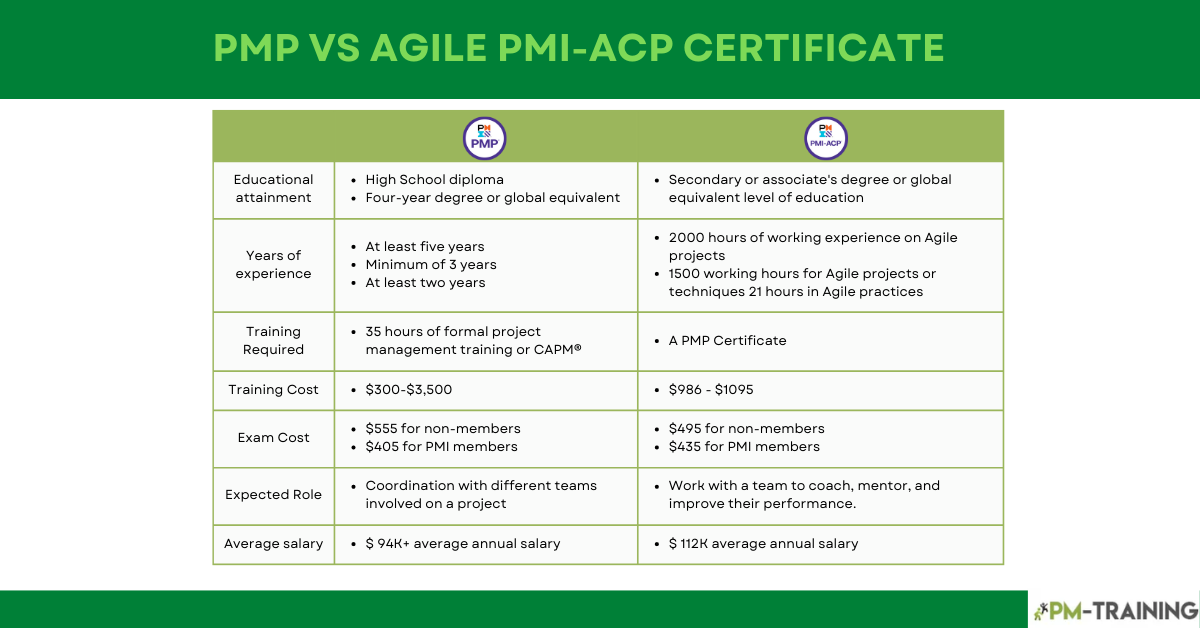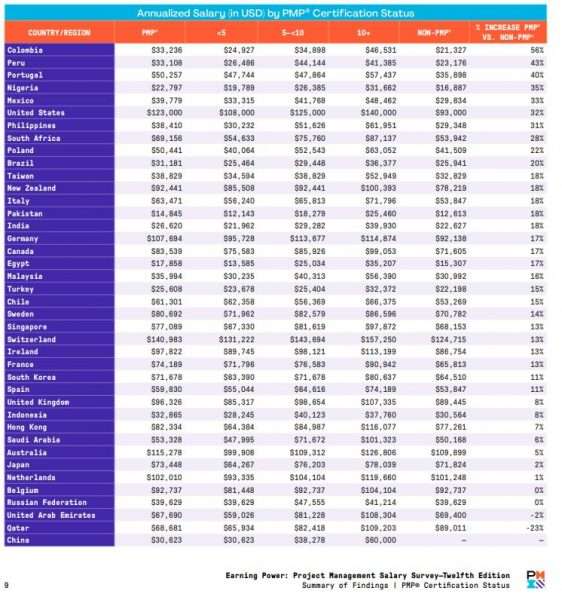As project managers, it is best to have the Project Management Professional (PMP) and PMI Agile Certified Practitioner (PMI-ACP) certification, but taking them both can be costly and time-consuming.
And so in this blog post, we will look into PMP and PMI-ACP to help you understand the key similarities and differences between the two. It is to help you decide which is best suited for your organization and your personal goals.
The main difference between PMP vs PMI-ACP is the study time due to the lack of superfluous processes in PMBOK you don’t need to know. You will save preparation time by reading the PMBOK, with far less study scope making it a lot easier to approach.
There are several factors you should consider when deciding whether to take the PMI-ACP or the PMP exam, including your career goals, present circumstances, and cost.
Preparation Time Required
Even though there is no set schedule for how long preparation will take, you should allow a few weeks to prepare. PMP would take more time out of the two exams since the material covered is more extensive and the Exam itself is longer.
PMP: 8-6 Weeks
PMI-ACP: 4 Weeks
PMI-ACP concentrates on Agile while PMP broadens your perspective of project management. If you are planning to work with incremental development, then PMI-ACP would be beneficial for you, but if your focus is understanding how to incorporate the different aspects of project management, PMP is the better choice for you.
If you have enough resources and time, you can also get both certifications. But if that’s not feasible for you, remember to consider what your future goals are and which certification will help get you there.
Scope of Exams
The PMP exam contains 180 questions that combine multiple choice, multiple response, matching, hotspot, and fill-in-the-blank sections. The exam runs for 230 minutes and has more scenario-based questions, including animations, to test your agility, flexibility, and soft skills.
About 50% of the test will cover predictive project management approaches, and the other half will touch on agile or hybrid approaches. You can find elements of all methodologies throughout the three domains: People, Process, and Business Environment.
Moreover, if you’re looking to move out of your current job or learn how to manage and run a business, PMP is the right course for you. However, if you’re interested in learning agile methodology, then ACP will be more beneficial. The PMI-ACP Exam contains 100 scored items and 20 unscored (pre-test) items in total, and you have 3 hours to finish it. The unscored items are not identified and are randomly distributed throughout the Exam. The “experimental” questions are being tested for inclusion in future versions of the Exam.
Approach

When deciding what training to use for PMP® certification prep, make sure to use PMI’s free PMP Exam Content Outline for the most up-to-date information on the certification exam.
The PMI-ACP teaches risk management from an agile perspective, while the PMP provides insights into general risk management. If you’re interested mainly in Agile, then ACP is for you. However, if you want to gain a deeper understanding of Project Management from a general perspective, PMP Certification is what you need.
The PMI-ACP spans many agile approaches, including Scrum, Kanban, Lean, XP, and TDD. Simply put, it is evidence of your real-world experience working on an agile team.
As a PMI-ACP, you must be knowledgeable in all aspects of the Agile methodology and adaptable to changes that may occur during the project. It is also crucial that you properly coordinate with other team members to ensure everything runs smoothly.
What is PMP?
The PMP is a Project Management Institute (PMI) certification. It is a credential that is widely recognized by experts in the project management field. PMP demonstrates extensive experience, education and skills needed to be successful in leading and directing projects.
PMP not only enhances your skill sets for projects but also gives a comprehensive understanding of project processes and best practices. You will be tested on your ability to initiate, plan, execute, monitor, control, and close a project upon completion.
What is PMI-ACP?
The ACP is a globally recognized certification that demonstrates a high level of professional competence in agile principles, training, and project management. This credential is essential for anyone pursuing a career in Agile Project Management.
It is for project management professionals who want to improve their knowledge of agile principles and methodology. It is also essential for companies or organizations currently running or planning to shift to agile practices.
PMP vs PMI-ACP Benefits
Set an edge over your competitors
The PMP certification program helps candidates stand out from other applicants when applying for jobs.
Advanced knowledge of project management
This course will equip you with the skills and knowledge necessary to manage a project from start to finish, helping you boost your company’s profits.
Better compensation and opportunities
By earning your PMP certification, you will be eligible for higher salaries and promotions as companies recognize the value of your skills in managing projects effectively.
Improved performance
A PMP certificate will always boost your performance as a project manager so you can handle more challenging projects.
PMI-ACP Certification Benefits
Enhanced knowledge of project managers
The PMI-ACP credential entails learning various hard and soft skills and expanding your understanding of essential project management processes tools & techniques. You will also be exposed to best practices and current trends in agile project management.
Better calibre as a project manager
Passing the PMI-ACP Exam and getting a certificate sets a standard for you to meet as a professional and boosts your confidence and reputation in the company.
Higher chance of promotion and higher pay
The PMI-ACP certificate increases your chance to get a high salary. Of course, your promotion will depend on your experience and understanding of the methodology.
Industry Recognition
PMP vs PMI-ACP Salary
The PMI-ACP certification is globally recognized, allowing you to work anywhere in the world. It demonstrates your expertise and skill level in agile project management, which will immediately capture the attention of potential employers.
As of Dec 6, 2022, the average annual pay for a PMI ACP in the United States is $132,505 a year. PMI ACP Salary ($132,505 – December 2022) ZipRecruiter

Project Management Salary Survey—Twelfth Edition | Project Management Institute (pmi.org)
A project manager’s expectations differ depending on the demographics, cultures, and industries they work with. With a PMI-ACP certification, you will be recognized for your professional achievements globally so that you can focus on other areas.
Frequently Asked Questions (FAQs)
Which is harder: PMI-ACP or PMP?
If you’ve previously taken the PMP exam, you’ll find the PMI-ACP exam considerably easier. On average, you’re given 1.5 minutes per question, which is more time than what’s allowed on the PMP test. To qualify for the exam, PMP also requires a higher level of work experience.
Which PMI certification is the most recognized?
The PMP Certification is one of the most globally recognized project management certifications. The credential is recognized by many industries and would benefit any project manager as it allows you to produce better results for your employer while increasing your salary. With a PMP certification, you can work in any industry across the world with any methodology.
The PMP certification ensures you have project management skills and verifies that you possess leadership abilities. These include expertise in agile, hybrid, and predictive (Waterfall) techniques.
What jobs can I get with PMI-ACP?
Here are the PMI-ACP certification job opportunities:
– PMP Scrum Master
– Technical Business Analyst
– Agile Trainer
– Project Manager
– Digital Channel Planner
– Deputy Project Manager
– Director – Planning and Project Management
– Business Analyst
– Agile Project Manager
